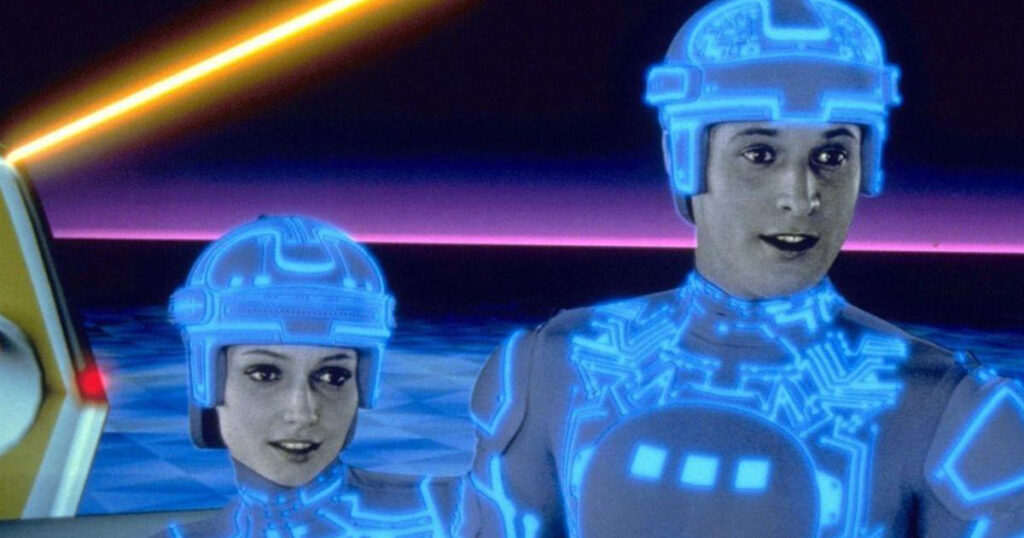[6]
Prior to Tron, computer animation appeared in a scene here and there, in films like Star Wars and The Black Hole, but Tron marked the first extensive use of it. So it’s something of a cinematic milestone, the great-grandfather of modern CGI fests like Avatar. Tron looks and sounds like no other movie with its austere digitally-rendered landscapes, the characters in glowing tights, and a gitchy electronic score by Wendy Carlos.
The film is the first, to my knowledge, to take place in cyberspace, with “users” in the real world communicating with “programs” inside a network of computers to defeat an authoritarian Master Control program, played by David Warner (Time Bandits). Jeff Bridges is the main star, playing an ex-employee of the tech company who hacks into the system to find proof that the current CEO (also played by David Warner) rose to power by stealing his intellectual property. Warner thwarts his efforts by ‘digitizing’ him — dematerializing him in the real world, and transposing him into cyberspace where he’s sentenced by Master Control to participate in a series of gladiatorial video games a la Spartacus or Gladiator. But Bridges escapes and ultimately teams up with a heralded new program named Tron (Bruce Boxleitner) who was designed by a user (also played by Boxleitner) with intentions of keeping the dastardly CEO and his Master Program in check.
If all this sounds convoluted and confusing, it kinda is. I never fully understood Tron when I saw it several times growing up, but I still managed to moderately enjoy it on some visceral level. Upon my most recent viewing, I was most interested in its religious allegory. Inside the computer world, programs are split between those that believe in the god-like ‘users’ who created them, and those who don’t. While in cyberspace, Bridges character keeps his user identity a secret from the programs until one of the programs dies in his arms and he confesses, essentially confirming the program’s ‘faith’. Boxleitner’s Tron character also takes on a Christ-like purpose, as he’s the program created by the ‘divine’ user who instructs him how to overthrow Master Control. A pivotal scene where Tron directly communicates with Boxleitner’s real-world doppelganger feels remarkably like the Burning Bush story of Exodus.
Tron is visually compelling and conceptually interesting, but it is held back by a screenplay that develops in a cold, methodical manner. In spite of a charismatic cast, you never care much about any of the characters. But the movie’s legacy has survived, nurtured a cult, and even spawned a sequel (Tron: Legacy) twenty-eight years later.
With Cindy Morgan, Barnard Hughes, and Dan Shor. Directed by Steven Lisberger.

